They view themselves as the rubble the war left behind
Godzilla!
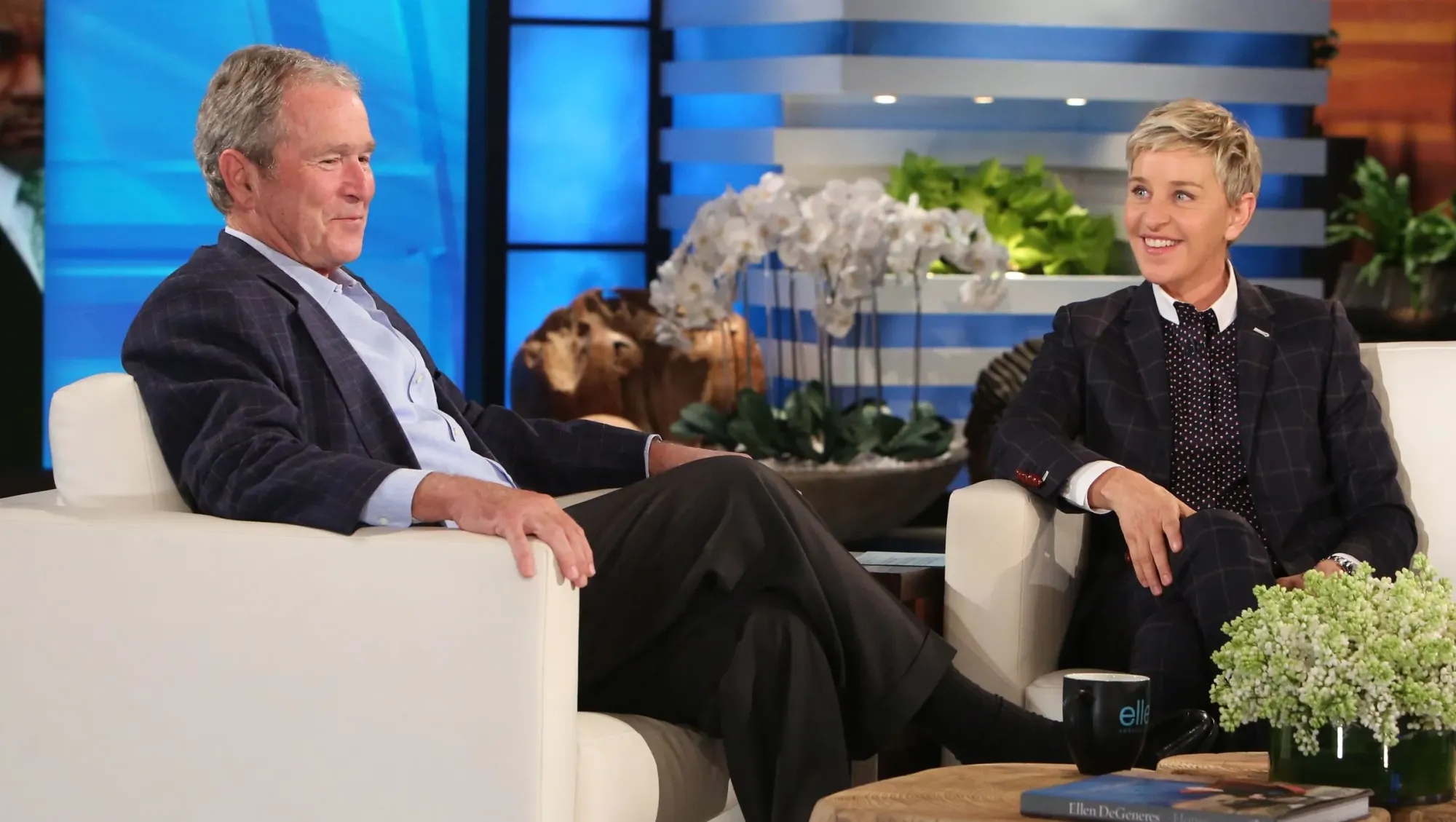
Sorry or you're welcome for more pieces than usual this week. Today's main feature (for paid subscribers only) is by one of my favorite film and TV critics Sean T. Collins. Jumping off from the recently released Godzilla Minus One, Collins traces the evolution of the towering beastly metaphor from the 1954 original, up through more recent offerings, both good and bad, like the 2014 Godzilla and the terrifying 2016 Shin Godzilla. He writes in part:
Yamazki’s film is the best and worst of humanity refracted through a radioactive green lens. It’s uranium glass. It makes you feel the colossal weight of the crimes committed by both sides in World War II, embodies them in the form of Godzilla, and unleashes it on people who do not deserve to suffer and die. What more could you possibly ask from a horror movie?
...
We’ve already had one chilling spectacle about the horrors of nuclear war at cinemas this year, an excellent one at that, as even this Nolan skeptic will happily admit. What we didn’t have until Godzilla Minus One is a film about how the horrors of nuclear war hurt normal people. Oppenheimer’s protagonists are the people directly responsible for the bomb, people with famous names and high-level government clearances; Godzilla Minus One’s protagonists are soldiers and sailors and survivors. They very literally live in the rubble the war left behind. For a long time they view themselves as the rubble the war left behind. Rebuilding, physically and psychologically, is as hard for them to do as defeating the monster.
Subscribe to read that and every other Hell World piece both new and old.
Did you miss this fun and lovely and sad one from the other day about The Cure?
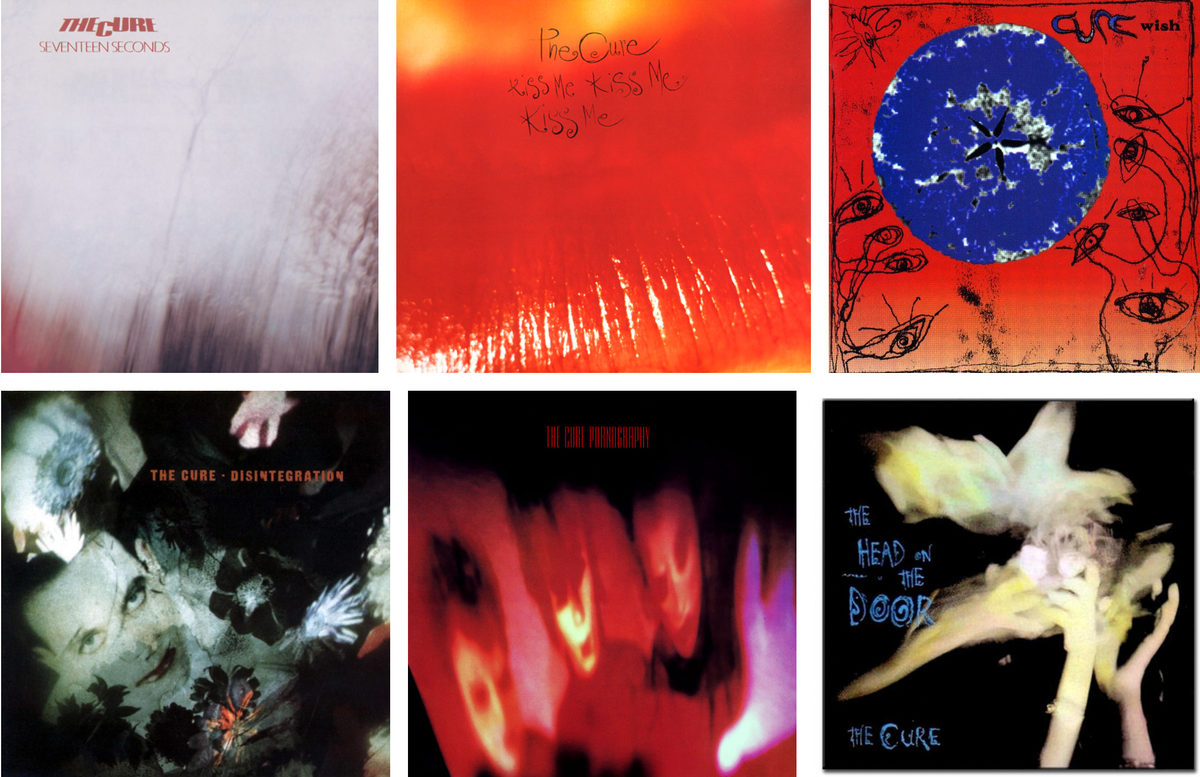
Now let's talk about another world-bestriding monster. I caught up with filmmaker Christopher Jason Bell about his latest project for MeansTV called Miss Me Yet. Watch the trailer here and the full series here.
Miss Me Yet mixes archival footage of George W. Bush, dramatic and mundane, alongside footage of people around the world his wars devastated, all intercut with contemporaneous pop culture commercials in a way that I found compelling and weirdly hypnotic, albeit always downright terrible and unsettling. Specifically hard to watch was all the Islamophobia and racism of that era being used to justify "killing the terrorists" sounding very much like the same things we are hearing today as Israel continues its U.S.-blessed massacre and ethnic cleansing project in Gaza.
What was the idea behind this project when you set out?
This was like 2014, when you really started to see the rehab of George W. Bush in the media and, even more so, via the Obama presidency. His dalliances with Michelle Obama. Sharing candy and what not. The contrast between him and the impending Trump presidency. It made me think of growing up as a teen during the Bush presidency and everything that came with it – 9/11, protests, tax cuts, surveillance state, mass death and murder – and how that would function as a story, with the final act somehow ending up with Bush's appearance on Ellen. Not even as a filmmaker but as a film fanatic I'm always thinking "man that would be an interesting movie, someone should make it" and what ends up happening is that I repeat that thought over and over until I end up making the damn thing.
Laying all of the clips of his speeches and appearances and what-not seemed really interesting to me as a work – no voice over, just let the footage speak for itself. Or, rather, the re-contextualization of these clips and their placement within the story would drive things forward. It seemed like an interesting challenge that would cost no money and also something that maybe people would want to watch. Also, again, I could not stop thinking about it so I had to get it out of my head and into the real world!
Tell me about the decision to include the old commercials interspersed throughout all of the footage of Bush and news media reports and so on. The effect is something like an Adult Swim type show, or a found footage VHS-retro horror movie type of thing. Were both of those styles in mind when putting this together?
The mixing of the two actually came much later in the process, which is funny because in the end it is very integral to the whole thing. There was a feeling that maybe the Bush material would get a little bit repetitive and punishing – there's only so much footage of him not talking, there's only so much footage of an interesting camera move (catching the occasional camera zoom was such a joyous occasion) – and there's also the idea of the context in which he's operating within that you don't necessarily get just by watching footage of him speak to the press.
Importantly, having these two types of footage together (Bush + pop culture) did make a bunch of narrative elements, themes, and ideas possible: it tied the micro and macro together, it highlighted the many alienating contradictions we lived (and continue to live) through, and displayed the way politics and the media machine both converse and feed one another. Of course you're also tugging at the nostalgia of the viewer which is inevitable, so it's a trip down memory lane for the audience while also recontextualizing and highlighting various things.
It's funny because Adult Swim shows were a part of my life around this time, too, so I'm sure I have some of that Tim & Eric kind of video editing and manipulation ingrained. Found footage is always something I'm thinking about. It's a form that is both overused and under-thought – there's so many interesting things to be made in that way and I'm always thinking of how to break that genre open for future projects.
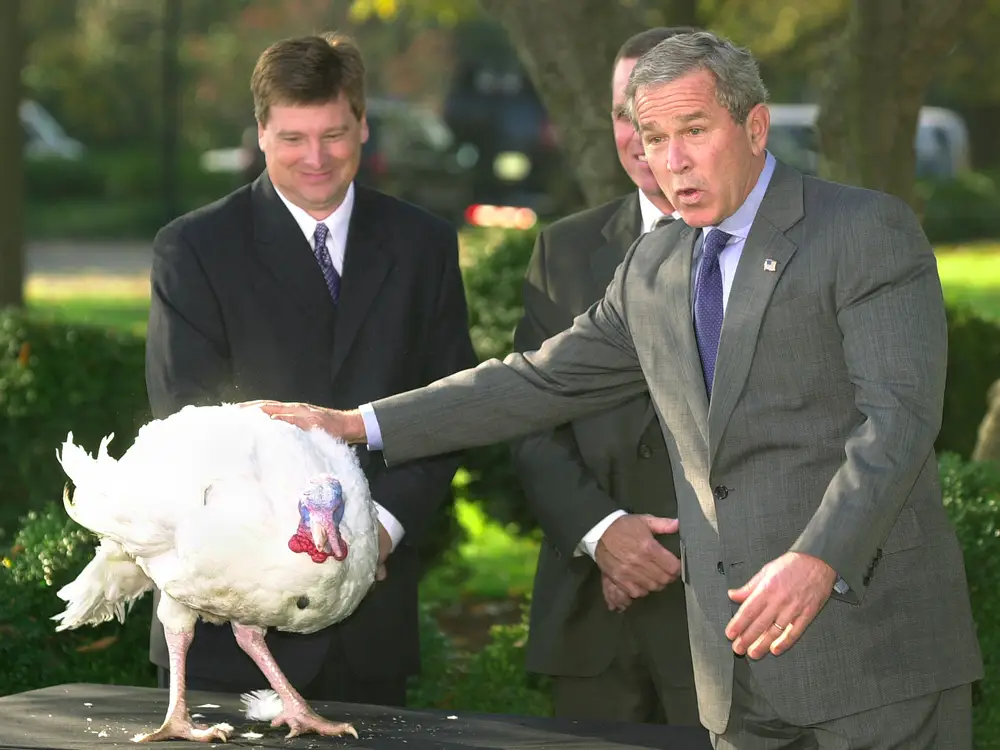
I guess it's kind of obvious, but this is the point, right? That this period was a horror. But also horrifically funny in its way.
Yes! Again, that's the weird contradiction. He was funny. There are so many absurd things happening. The deaths are tragic, but also absurd. Why does the system persist like this? And I mean, we know the answer. Still, it's so easy to lose your mind.
What do you think the juxtaposition of the scenes of suffering in Afghanistan back to back with Bush goofing around does for the viewer?
I definitely always worry that maybe it comes off cheeky or glib which is not my intention, but you only have so much control over audience interpretation. That said, suffering in Afghanistan and Iraq during that time were not given the time of day. Not even the protests here were really televised. And I think we do need to sit with that and reckon with it, and I wanted to drive it home. This is the human cost that our country is taking, and here's how those in power then go about their day-to-day.
Some people lay in bed at night and be like man, when I was 6, this guy made fun of me, I should've done this and this. Or maybe you were the bully, and you have regrets. Then you have people with massive power being like oh, sanction this country because their leader is a villain, and the sanctions are so broad that it means that a person now does not have access to proper eye medication. And then those people in power have the gall to go in front of cameras and pardon a turkey.
It strikes me that something like this is just a condensed version of what life was like back then as we lived through it – watching American Idol and Ally McBeal and shit while the country was changing for the worse and we were killing so many people in the Middle East. Do you remember that feeling?
Absolutely, but you know... I was a pre-teen/teen, and I just didn't know how to think about it. Like, this is just regular, right? But it wasn't. But... it was! I didn't have the lens to interpret things that I have now.
It's also kind of the effect I write about a lot of being online now. Images of war crimes in our feed followed up by silly jokes, TikTok skits, then news of a mass shooting, then a football highlight, then more war crimes and on and on in a never ending cycle. None of this whiplash of horror and entertainment is new, it's just interesting to be reminded of what it was like pre-social media.
Right, and what it would become. I did have a little bit of that storyline in the series, the narrative of the internet, Web 2.0, evolving into the social media age. Everything accelerated. You did have a little more time to sit with things to an extent – what exactly you sat with, though, did not really change. Like you're only getting a certain version of a story. Chomsky, Herman and Parenti were very helpful in this kind of media analysis. Also, with 24/7 cable news, the process was already beginning of constant and specific stories being rapidly put in front of us. Then, of course, TV and radio itself... the "Now... This" kind of mentality, where various news items are juxtaposed chaotically that Neil Postman talked about, was born around then and getting much worse.
In the episodes I watched there are obviously big moments, famous speeches, iconic scenes I remember – Bush reading the kid's book as the 9/11 attacks were starting, "Now watch this drive...", but lots of sort of behind the scenes things I don't think most of us had ever seen? Where did you get all the footage from, and how did you go about choosing what to use?
I mostly just went on a few news websites and ripped everything and then sorted from there. It took me a very long time because this was essentially a side project that I could do when I couldn't afford to produce other things, and I went through footage and just transcribed everything. A lot of times there were transcriptions, but it really helped me to do it myself and really take stock of what was going on and what was said in each clip.
Sometimes choosing things for the cut was easy – like is this too boring? I watched Bush get on and off planes. Yeah, that's an easy no. But given my parameters there had to be enough information and background within the footage of a speech to make sense – like there are a lot of speeches about trade bills that didn't make the cut because I couldn't figure out a way to not bog down the audience with tons of explainers. It wasn't that type of project. You do end up losing a lot, but I also had to come to terms with the fact that this series could be about a lot of things, but it couldn't be everything for everyone.
Then there's also very famous clips and moments where you wonder if maybe you don't need them. Or if you could wring something new out of them. Like I extended the "Now watch this drive" clip, and I have an extended bit of him sitting with the children as 9/11 happens. Then there are moments that I mentioned earlier where there's a cool camera move, which really just means that there is a camera move. And it means nothing to the camera operator within the moment – maybe it's even a mistake – but within this sea of repurposed footage, it packs a huge punch emotionally. Those immediately go in.
I did find those rare seemingly random or accidental camera moves oddly unmooring. What is some of the footage you used here that shocked you or stuck with you most? Or that felt like a new discovery to you?
The weirder pop culture stuff like Bush on Deal or No Deal, or him playing basketball and missing every shot were just too good for many obvious reasons. Also the aforementioned video of him with the kids on 9/11. I actually did not know that they had video of that. So that was a real discovery for me and an interesting way to, ahem, "introduce" 9/11 into the series.
A lot of the Afghanistan and Iraq stuff was new to me. The death and destruction was depressing. The interviews with people are things I never saw before and people were very open about what was going on, how they felt about Saddam or Karzai, how they felt about the incoming Obama administration... it was very important that all of this made it into the series. As we see this year, there is still a lot of really heinous and belittling stuff that Americans think of those who live in Middle Eastern countries, so it was integral that their voices be included in this.
What about the pop culture stuff? Did you remember most of this or were there some things that were like what the fuck is this?
I remembered a good deal of it, though sometimes it was just me working on an episode and watching a few commercial compilations on YouTube and pulling various things. If something was especially bizarre – like over sexualized product commercials – that was a keeper, for instance. And then you just see what commercial or episode clip or whatever ends up being a dialogue with the other footage. Sometimes it doesn't happen until episodes later or so. Choosing footage for this series at all was kinda intense that way because everything had to work on at least two levels – it had to be something pleasing on the surface of it, you know, just have undeniable power. But then it also had to relate to the bigger picture, or point.
It also struck me, and this is kind of obvious too, how much of the bloodthirsty and Islamophobic rhetoric used then is being recycled right now as we speak.
Yup! Exactly. Which is many things: disgusting, abhorrent, disappointing. There was a part of me during the Bush rehabilitation process of 2014ish where I thought "I thought we learned something...? What are we doing?" and I have that same feeling with the current rhetoric.
Before we get to Godzilla some other news from around the world.
Just Stop Oil activist jailed for six months for taking part in slow march
A climate activist has been jailed for six months after pleading guilty to taking part in a peaceful slow march protest on a London road.
The sentence handed to Stephen Gingell, 57, is thought to be the first jailing under a new law that critics say makes anyone walking in a road liable for prosecution for “interference with key national infrastructure.”
BBC:
Hostages were holding white cloth on stick when Israeli forces shot them, army says
The IDF says three Israeli hostages who were mistakenly killed in Gaza by the Israeli military had been holding up a white cloth on a stick.
An initial report by Israel's military into the deaths found that the hostages were fired upon against Israel's rules of engagement.
Warner Robins teacher accused of threatening to kill student over comment about his Israeli flag
WARNER ROBINS, Ga. — A Warner Robins teacher is accused of threatening to behead a student after she made a comment about his Israeli flag, according to the Houston County Sheriff's Office.
Benjamin Reese is a 7th-grade social studies teacher at Warner Robins Middle School. He was arrested on Dec. 8.
Several witnesses said they overheard Reese shouting "You motherfucking piece of shit! I'll kick your ass. I should cut your motherfucking head off," around students on Friday.
Grand jury clears Indianola officer who shot 11-year-old boy
Nearly seven months after an Indianola police officer shot an 11-year-old boy in the chest during a domestic call, a Sunflower County grand jury decided not to indict him after hearing evidence from the attorney general’s office, according to a Thursday statement from the office.
Meanwhile the child’s mother, after finally seeing the body camera footage from the shooting is asking for it to be released publicly.
CNN:
Millennial women are facing the first decline in well-being since the Silent Generation, report says
The homicide rate for millennial women increased compared with Generation X, according to the data. Suicide rates have nearly doubled from Gen Xers to millennials, and maternal mortality rates have risen dramatically, the report showed.
The disparities in health and well-being are even greater for women of color, the data indicated.
Black maternal mortality is more than twice the US national average, and Black and Hispanic students were less likely to receive subsidies for college than their White peers of similar economic status, according to the report.
AP:
US homelessness up 12% to highest reported level as rents soar and coronavirus pandemic aid lapses
The United States experienced a dramatic 12% increase in homelessness to its highest reported level as soaring rents and a decline in coronavirus pandemic assistance combined to put housing out of reach for more Americans, federal officials said Friday.
About 653,000 people were homeless, the most since the country began using the yearly point-in-time survey in 2007. The total in the January count represents an increase of about 70,650 from a year earlier.
The latest estimate indicates that people becoming homeless for the first time were behind much of the increase.
Oh and check out this from my stomping grounds of Waltham, MA.
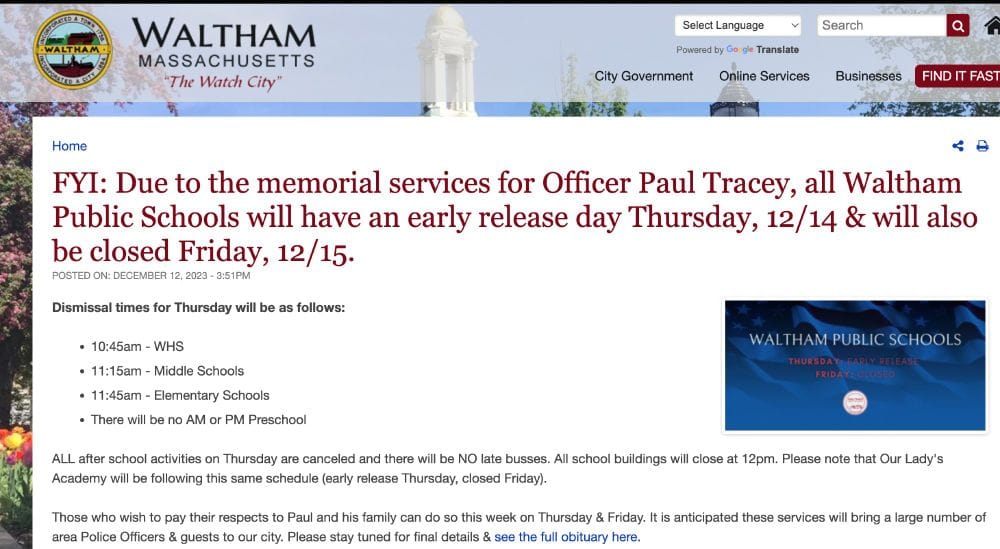
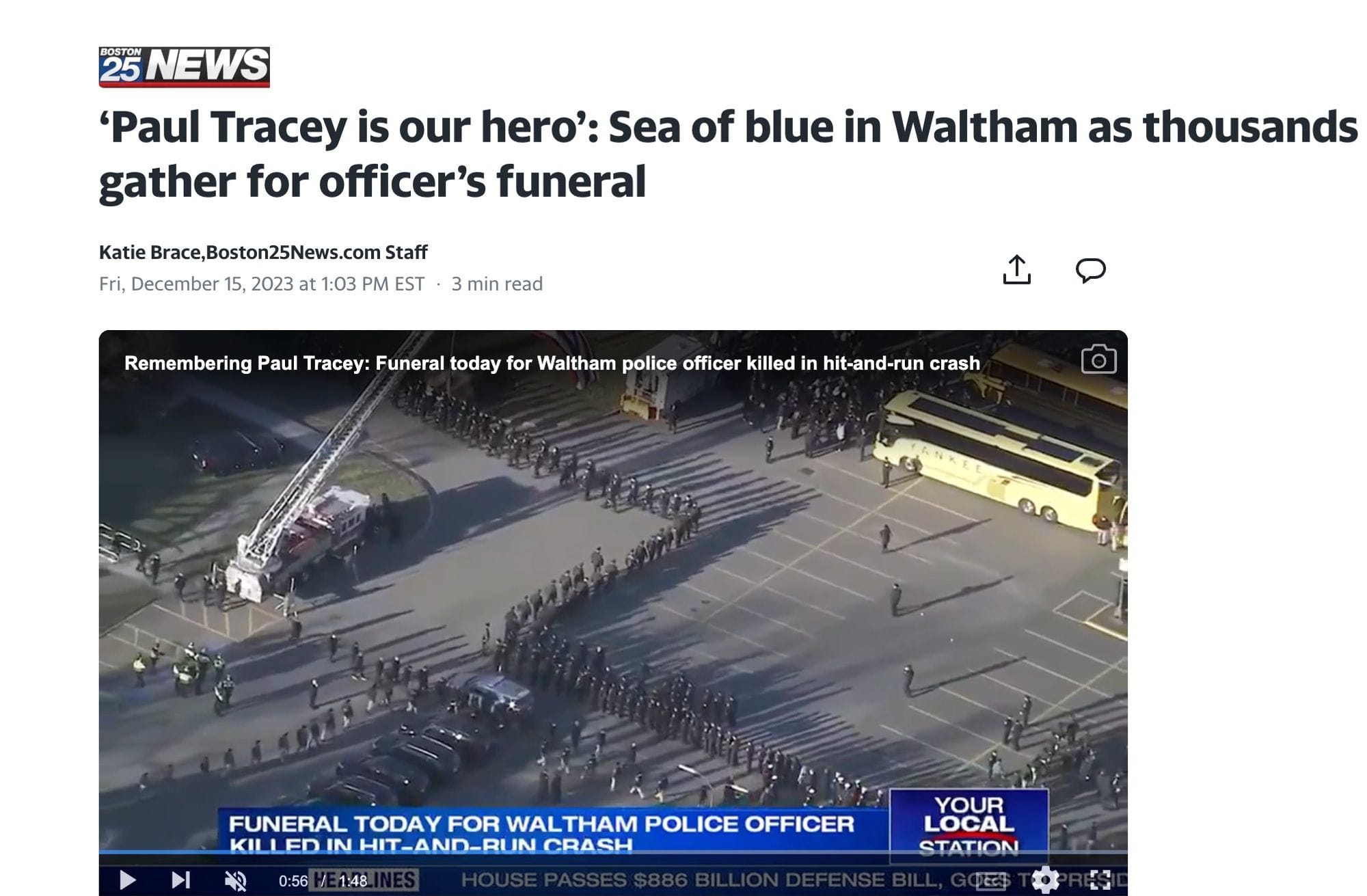
Waltham – a city of about 65,000, ten miles or so outside of Boston – closed down schools and many major roads for almost two full days because the police needed to commandeer the school buses to ship in cops and mourners from all over to attend the funeral of an officer named Paul Tracey. Tracey was killed along with a – much less mentioned in the local news – National Grid worker named Roderick Jackson when a man drove into them while they were working on the side of the road. Never let it be said that we don't have our hierarchy of citizenry in order in this country.

History Shows Again and Again How Nature Points Out the Folly of Man
by Sean T. Collins
